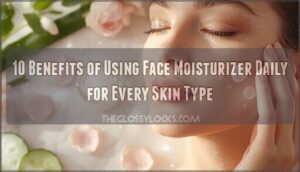This site is supported by our readers. We may earn a commission, at no cost to you, if you purchase through links.

Start with gentle cleansing and smart moisturizing to maintain bounce. Weekly AHA exfoliation and a daily boost from vitamin C or retinol can help your skin look firmer and more youthful.
Hyaluronic acid keeps things plump, while peptides are the silent encouragers, signaling your skin to produce more collagen.
Stick to your routine, and don’t skip facial massage for an extra perk-up. Curious about which habits really make a difference? There’s more to discover about improving skin elasticity.
Table Of Contents
- Key Takeaways
- What is Skin Elasticity?
- How to Improve Skin Elasticity
- Top Lifestyle Changes for Firmer Skin
- Effective Topical and Oral Solutions
- Advanced Therapies and Prevention Tips
- Frequently Asked Questions (FAQs)
- How can I improve my skin elasticity?
- What are the best foods to eat to improve skin elasticity?
- How to increase face elasticity?
- Why is skin elasticity important?
- Can skin elasticity be improved at any age?
- What causes reduced skin elasticity?
- Can skin elasticity be restored?
- How to boost elastin in skin?
- What vitamin helps skin elasticity?
- Can collagen reverse sagging skin?
- Conclusion
Key Takeaways
- Use gentle cleansers, moisturizers, and SPF daily to keep your skin barrier strong and prevent further collagen breakdown.
- Add vitamin C, retinol, hyaluronic acid, and peptides to your routine to kickstart collagen and elastin production and boost firmness.
- Eat antioxidant-rich foods like berries, leafy greens, and avocados, and stay hydrated to support your skin’s structure from within.
- Get enough sleep, manage stress, and massage your face to help your skin recover, bounce back, and look healthier.
What is Skin Elasticity?
Your skin’s elasticity is its ability to stretch and bounce back to its original shape, much like a rubber band that snaps back after being pulled.
Skin elasticity is your skin’s secret superpower, letting it stretch and rebound just like a fresh rubber band
When you pinch the skin on the back of your hand and it quickly returns to normal, you’re seeing healthy elasticity in action.
The Role of Collagen and Elastin
Your skin’s structural foundation depends on two protein powerhouses working in harmony. Collagen provides strength and structure, while elastin fibers allow stretching and bounce-back recovery.
Here’s how they maintain skin firming:
- Collagen production creates scaffolding that keeps skin plump and smooth
- Elastin fibers act like rubber bands, enabling stretch and recoil
- Elasticity boosters like collagen supplements support both proteins’ functions
These proteins work together to improve skin elasticity naturally.
How Skin Elasticity Changes With Age
Starting in your twenties, collagen production naturally decreases by about 1% annually, marking the beginning of your skin’s elasticity loss journey.
This gradual decline accelerates substantially during menopause when hormonal changes further reduce collagen synthesis. Understanding the role of natural remedies can help mitigate this process.
| Age Range | Collagen Decline Rate | Skin Changes | Elasticity Impact |
|---|---|---|---|
| 20s-30s | 1% annually | Subtle firmness loss | Minimal visible effects |
| 40s-50s | 1.5% annually | Noticeable sagging | Moderate elasticity loss |
| 60s+ | 2-3% annually | Pronounced wrinkles | Significant firmness decline |
Signs of Reduced Elasticity
Recognizing elasticity loss isn’t rocket science—your skin tells the story.
When you pinch your cheek and it slowly returns to position, that’s skin sagging in action.
You’ll notice wrinkle formation deepening around your eyes and mouth, while skin thinning becomes apparent on your hands and arms.
Collagen depletion manifests as reduced bounce-back ability and overall firmness loss, which is a clear sign of elasticity loss, and it affects the skin’s overall appearance, including its bounce-back ability.
How to Improve Skin Elasticity
You can rebuild your skin’s bounce and firmness through targeted skincare routines, smart ingredient choices, and consistent daily habits.
While collagen naturally decreases with age, specific approaches can help restore elasticity and maintain a youthful appearance.
Daily Skincare Habits That Boost Firmness
Building consistent daily routines reveals your skin’s natural firmness potential.
These foundational habits create the groundwork for lasting elasticity improvements:
- Gentle Cleansing: Use mild, non-stripping cleansers twice daily to maintain your skin’s protective barrier without causing irritation or moisture loss.
- Smart Moisturizing Routines: Apply hydrating formulas immediately after cleansing to lock in moisture and support surface plumpness throughout the day.
- Weekly Exfoliation Techniques: Incorporate AHA-based products 1-3 times weekly to stimulate cell turnover and enhance your skin’s natural bounce-back ability.
To improve skin elasticity, consider adopting habits that promote skin health tips.
Key Ingredients for Supporting Elasticity
Powerful ingredients can transform your skin’s bounce-back ability.
Vitamin C kickstarts collagen production while protecting against daily damage.
Retinol cream works overnight to rebuild elastin fibers and smooth fine lines.
Hyaluronic acid acts like a moisture magnet, plumping skin from within.
Collagen boosters including peptides signal your skin to create fresh proteins.
Omega rich oils strengthen your skin barrier, locking in hydration and flexibility.
Understanding skin care basics is essential for selecting the right products to improve skin elasticity and achieve a healthy glow with the right skin care routine.
Tips for Maintaining Youthful Skin
Consistency beats perfection in maintaining youthful skin.
Small daily habits compound over time, creating visible improvements in elasticity and firmness.
You’ll see the best results by sticking to proven routines that support your skin’s natural renewal process.
- Facial massage boosts circulation and promotes lymphatic drainage, helping maintain skin tone
- Gentle elasticity exercises like facial yoga can strengthen underlying muscles for better support
- Natural skin care routines using antioxidant-rich products protect against daily environmental damage
- Consistent sun protection prevents further collagen breakdown and preserves your skin’s bounce
- Quality sleep patterns allow ideal skin rejuvenation and collagen production overnight
Top Lifestyle Changes for Firmer Skin
Your daily habits directly impact how firm and resilient your skin remains as you age.
Simple changes in nutrition, sleep, hydration, and exercise can substantially boost collagen production and restore that youthful bounce to your skin, which can be achieved through simple changes.
Nutrition and Antioxidant-Rich Diets
Your plate holds the power to transform your skin from within.
Antioxidant foods like berries and leafy greens fight free radicals that break down collagen production. Omega-rich foods such as avocados and salmon provide essential fatty acids for skin structure.
Here’s your skin-boosting nutrition guide:
| Food Category | Top Choices | Skin Benefits |
|---|---|---|
| Vitamin C Sources | Citrus fruits, bell peppers | Collagen synthesis support |
| Omega-Rich Foods | Salmon, walnuts, flax seeds | Moisture retention, inflammation reduction |
| Antioxidant Powerhouses | Blueberries, dark chocolate | Free radical protection |
| Collagen Boosters | Bone broth, leafy greens | Direct elastin and collagen support |
Research shows women consuming daily avocados increased facial skin elasticity substantially over eight weeks. Vitamin C intake correlates directly with improved skin bounce-back ability.
Your kitchen becomes your skincare lab when you choose nutrient-dense, antioxidant-rich foods that naturally improve skin elasticity. Incorporating avocado health benefits into your diet can have a profound impact on your skin’s overall health and appearance.
Hydration and Its Impact on Skin Bounce
Water intake directly impacts your skin’s ability to bounce back from pressure and maintain firmness.
When you’re properly hydrated, your cells retain moisture more effectively, creating that coveted plump skin appearance.
Adequate hydration enhances skin elasticity by supporting the dermis layer where collagen and elastin reside.
Drink water consistently throughout the day for ideal moisture retention and skin bounce—your complexion will thank you.
The Importance of Sleep and Stress Reduction
Your sleep patterns directly influence skin rejuvenation and collagen production. Sleep deprivation disrupts your body’s natural repair processes, accelerating aging and reducing elasticity. Quality rest allows cellular regeneration while stress management prevents collagen breakdown.
Essential practices for skin-supporting sleep and stress management:
- Maintain consistent sleep schedules (7-9 hours nightly)
- Practice deep breathing exercises before bed
- Use mindful meditation to reduce cortisol levels
- Create relaxing bedtime routines with relaxation techniques
- Limit screen time two hours before sleep
Chronic stress releases hormones that damage skin structure, making proper stress management essential for maintaining firmness.
Exercise and Skin Health
Physical activity pumps blood to your skin, delivering oxygen and nutrients that support collagen production.
Exercise energizes your skin, delivering fresh oxygen and nutrients for a glowing, collagen-rich complexion
Regular exercise routines boost circulation and help flush toxins that break down elastin fibers. Facial yoga routines target specific muscles, promoting firmness through controlled skin stretching movements.
| Exercise Type | Skin Benefits |
|---|---|
| Cardio workouts | Increases blood flow and oxygen delivery |
| Facial yoga routines | Strengthens facial muscles and improves tone |
| Strength training | Boosts growth hormone production for repair |
Effective Topical and Oral Solutions
You’ve got powerful allies in the fight against sagging skin, and they’re closer than you think.
From proven ingredients like retinol that kickstart collagen production to simple oral supplements that work from the inside out, these targeted solutions can help restore your skin’s bounce and firmness.
They can help restore your skin’s firmness.
Retinol, Retinoids, and Peptides
Retinol and retinoids reveal your skin’s potential by boosting collagen production up to 32%.
These powerhouse ingredients activate cellular renewal, while peptides act as messengers that enhance elastin synthesis. You’ll see firmer skin within weeks—retinoids improve elasticity by 42% compared to untreated skin.
Start with 0.1% retinol nightly, gradually increasing strength for maximum anti-aging benefits. Incorporating broad spectrum SPF is essential for protecting your skin from further damage.
Hyaluronic Acid and Moisture Retention
Think of hyaluronic acid as your skin’s moisture magnet—it holds up to 1,000 times its weight in water.
This powerhouse ingredient delivers immediate hydration that translates to visible elasticity improvements within days.
- Hyaluronic Benefits: Plumps skin from within, reducing fine lines and increasing bounce-back
- Acid Serums: Apply to damp skin for maximum absorption and moisture retention
- Skin Hydration: Creates a moisture barrier that prevents water loss throughout the day
- Moisture Levels: Maintains ideal hydration for up to 24 hours with consistent use
- Elasticity Boost: Supports collagen function by keeping skin cells properly hydrated
Using a hyaluronic acid serum can enhance these benefits.
Collagen Supplements and Dietary Support
Oral collagen supplements pack a powerful punch for skin firming.
Meta-analyses of 23+ clinical trials show hydrolyzed collagen peptides substantially boost skin elasticity within 8-12 weeks.
Taking 10g daily increases firmness by 17% while supporting nutrient absorption and collagen production.
These elasticity boosters work by preventing collagen breakdown and stimulating new synthesis, giving you measurable dietary support for healthier skin.
Natural Remedies: Rosehip Oil, Gotu Kola, Aloe Vera
Natural remedies offer gentle yet effective ways to improve skin elasticity without harsh chemicals.
These plant-based solutions work by nourishing your skin’s natural collagen production and providing essential nutrients that support firmness and bounce-back ability.
Understanding the rosehip oil benefits is essential for maximizing its effects on skin elasticity.
- Apply rosehip oil to damp skin nightly – Rich in trans-retinoic acid and omega fatty acids for enhanced firmness
- Drink 1-2 cups of gotu kola tea daily – Stimulates fibroblasts that produce collagen and elastin naturally
- Use pure aloe vera gel as a hydrating serum – Contains polysaccharides that help retain moisture and support skin structure
- Create herbal toners from gotu kola – Apply topically 3 times weekly as a natural skin-firming treatment
Advanced Therapies and Prevention Tips
Beyond basic skincare, advanced treatments can substantially boost your skin’s elasticity when used correctly.
These professional-grade options and prevention strategies work together to give you the firmer, more resilient skin you’re looking for, utilizing advanced treatments to achieve the desired results.
Red Light and Microneedling Treatments
Advanced treatments can revolutionize your skin rejuvenation journey.
Red Light Therapy uses specific wavelengths to boost collagen production by up to 39%, while microneedling creates controlled micro-injuries that trigger natural healing responses.
| Treatment | Collagen Stimulation | Results Timeline |
|---|---|---|
| Red Light Therapy | 31-39% increase | 8-12 weeks |
| Microneedling Benefits | 45% epidermal thickness | 6 months |
| Combined Approach | 53% greater improvement | 6 weeks |
These skin tightening methods work synergistically—microneedling opens pathways for enhanced absorption while red light accelerates cellular repair, delivering visible facial tightening results.
Sun Protection and Limiting UV Exposure
Daily sunscreen use prevents up to 80% of visible skin aging and blocks collagen breakdown from UV rays.
Choose broad-spectrum SPF 30+ for thorough UVA and UVB protection.
Reapply every two hours, especially during peak sun hours (10 AM-4 PM).
Combine with protective clothing and wide-brimmed hats for maximum skin shielding against damaging ultraviolet radiation.
Managing Weight and Avoiding Smoking
Keep your skin snappy by embracing healthy habits—think of it as spring cleaning for your face.
Staying steady with weight loss, quitting smoking, and eating a balanced diet makes all the difference.
Here’s your cheat sheet:
- Prioritize smoking cessation
- Choose gradual weight loss
- Opt for a balanced diet
- Practice stress management
- Support collagen production
When to Seek Professional Advice
If stubborn sagging or sudden changes leave you scratching your head, consider a skin consultation or dermatologist referral.
A skilled skin care expert or dermatopathologist can spot underlying causes and guide you toward the right medical intervention, cosmetic surgery, or professional guidance.
Don’t let confusion linger; reaching out means you’re taking command over your skin elasticity loss, not just watching from the sidelines.
Frequently Asked Questions (FAQs)
How can I improve my skin elasticity?
Can collagen supplements really help your skin bounce back? Science says yes—combine them with vitamin C, antioxidant-rich foods, sunscreen, and a retinol cream.
Stay hydrated, ditch cigarettes, eat well, sleep deeply, and smile more often.
What are the best foods to eat to improve skin elasticity?
Load your plate with berries, citrus fruits, nuts, seeds, leafy greens, salmon, and avocados.
These foods are packed with vitamins and healthy fats, giving your skin the scaffolding it needs to stretch, bounce back, and glow.
How to increase face elasticity?
Feeling like your face lost its spring?
Pair sunscreen with vitamin C serums, eat antioxidant-rich foods, and drink water.
Retinol and hyaluronic acid boost bounce.
Nix smoking.
Think of your skin as a loyal, but moody, friend!
Why is skin elasticity important?
Skin elasticity keeps your skin snug and resilient, so you don’t end up looking like a deflated balloon after a big stretch.
It helps prevent sagging and wrinkles, letting you maintain a fresh, youthful appearance longer.
Can skin elasticity be improved at any age?
Well, don’t expect your skin to send you a postcard from its glory days—because yes, you can boost elasticity at any age.
Science backs up improvements with retinol, collagen, hydration, and lifestyle tweaks like nutrition and sun protection.
What causes reduced skin elasticity?
You’ll lose bounce in your skin as collagen and elastin break down with age, sun exposure, stress, and wild living.
Even dropping a lot of weight quickly or smoking can fast-track sagging and a leathery look.
Can skin elasticity be restored?
You can help restore elasticity by using retinol, hyaluronic acid, and antioxidants, staying hydrated, and eating well.
No magic fix exists, but with a little patience, your skin might just bounce back—like a trampoline after winter.
How to boost elastin in skin?
Think of your skin like a trampoline—it bounces back best with support.
Dial up elastin by wearing sunscreen, using retinol or peptides, eating antioxidant-rich foods, and skipping cigarettes.
Hydration and rest also keep that snap alive.
What vitamin helps skin elasticity?
Vitamin C powers up your skin’s ability to snap back, like a trampoline after a jump.
It’s the secret ingredient your body needs to build collagen—think of it as thread for tighter, bouncier skin.
Can collagen reverse sagging skin?
Chasing youth might feel like trying to catch fireflies—collagen can firm up your skin, but it won’t magically erase sagging.
Regular collagen supplements may improve elasticity, yet sagging rarely fully disappears.
Consistency is key.
Conclusion
Time doesn’t always tiptoe past your skin; sometimes, it leaves its mark.
Still, with the right habits and ingredients, you can improve skin elasticity and keep things looking firmer longer.
Make small, consistent changes—like nourishing your skin, eating well, and embracing sun protection.
It’s not magic, but routine care really works.
If you ever wonder how to improve skin elasticity, remember: what you do daily truly makes a difference for your skin’s future bounce.
- https://www.healthline.com/health/beauty-skin-care/skin-elasticity
- https://pmc.ncbi.nlm.nih.gov/articles/PMC11586210/
- https://belleclinic.co.uk/lifestyle-changes-to-combat-skin-laxity/
- https://www.mayoclinic.org/healthy-lifestyle/adult-health/in-depth/skin-care/art-20048237
- https://nassifmdskincare.com/blogs/skincare-news/skin-tightening-skincare-ingredients












